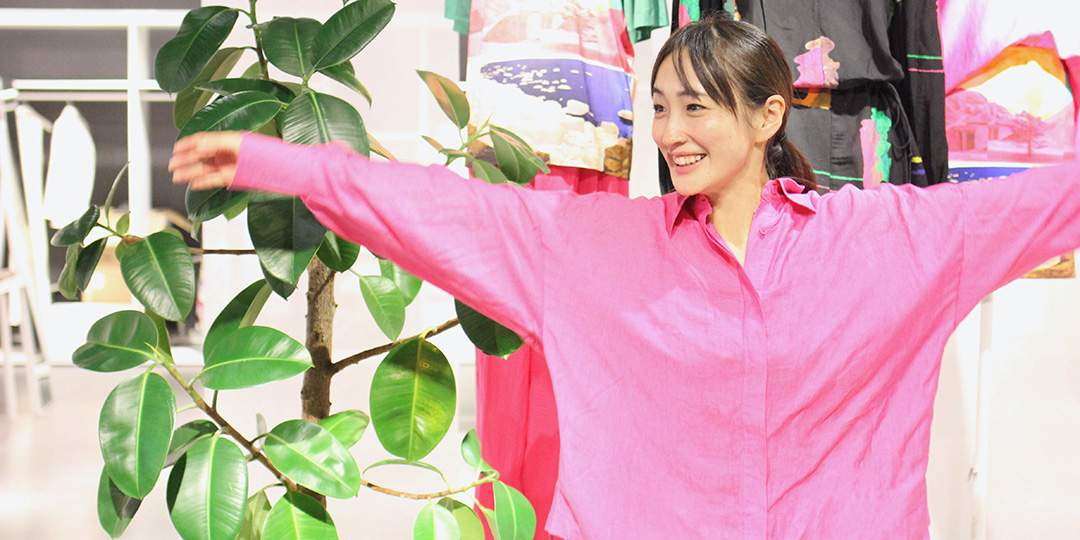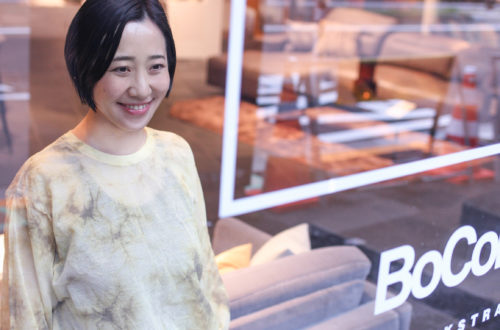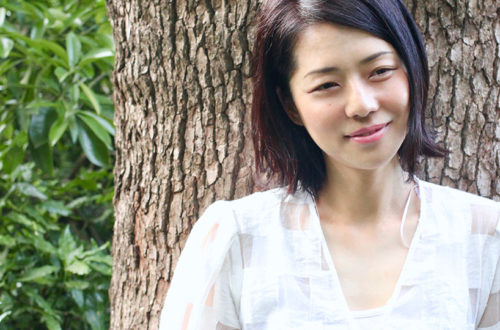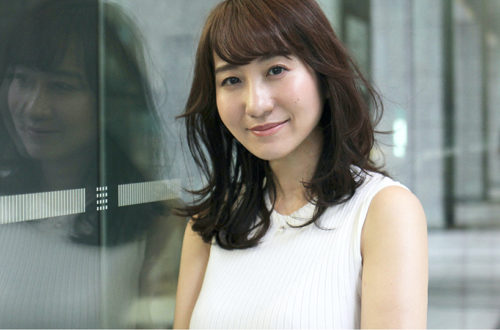Stay True To You
Yasuo Yasuo Do you have any experience living abroad or working with foreigners?
Maki Muroi Although I grew up in Japan, I studied abroad for three months in Canada right at the end of middle school, and returned there for another study abroad semester in college. I also attended a bilingual university in Japan.
Yasuo What was your first impression of going abroad?
Maki I was so excited to communicate with the limited English that I’d learned in middle school. It was so much fun!
Yasuo I thought I could speak English, but when I got to New York, I realized that I really couldn’t.
Maki Have you improved?
Yasuo My English is still not great, but now I’m not as embarrassed. I know I’ll never fully master it, but as long as I’m able to convey what I want to say, then I’m fine. When you can’t speak a certain language, the real meaning of communication and conversation changes for you.
Maki Communication is not always about language. Obsessing over incorrect grammar can kill your confidence. Yasuo, you’re particularly great because you’re so clear about what you want to say.
My child is growing up in a Japanese environment, which is rather homogenous and promotes self-sufficiency. However, I really want him to develop his own opinions, and find positive ways to express his feelings and beliefs.
Yasuo What I’ve found is that overseas, people are much more curious about what you have to say. The homogeneity of Japan creates a lot of like-minded thinking, which can work against your cultivation of self. There’s a commonly held belief that nothing needs to be said in order to be understood, but in other countries, such passiveness can be interpreted negatively, and even considered disrespectful.
Maki The Japanese style of environment is referred to as high context culture. On the other hand, Western societies have a low context culture with a strong emphasis on verbal cues. You can’t really expect someone to correctly guess or interpret meaning in such spaces.
Yasuo If a culture is composed of people from a variety of backgrounds, such as in Western countries, then assimilation and like-minded thinking are not as expected. However, Japanese people tend to judge things based on their intrinsic value, and when you differentiate from those standards, you’re treated as an outsider. I’m often treated as a “gaijin,” rather, the Japanese word for foreigner.
Maki My oldest child is in kindergarten, and his personality is so open and free. I’m nervous for him to enter elementary school next year because the expectations are so different. I never want him to change or reject his individuality, but society will push him to be non-disruptive and well behaved.
Yasuo While developing good manners and habits is important, children need encouragement towards creative and individualist thinking. Playing and creating in any environment is the key to a healthy and happy lifestyle.
Maki I agree. It’s so important to always be yourself.
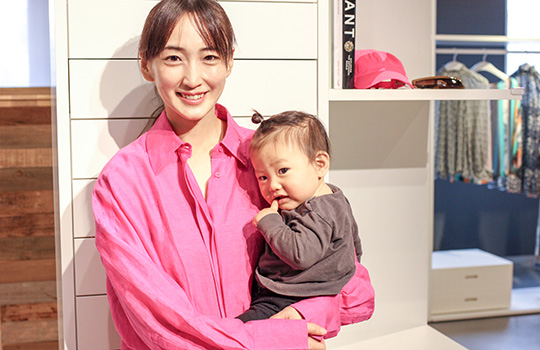
Striking A Balance
Maki I’m a people pleaser—it’s a quality that I was born with, and it never really caused me any problems until I joined H&M. When I started working with people from overseas, I realized that my tendency to constantly smile and reassure others worked against my best interests. While there’s nothing wrong with being upbeat and considerate towards others, it pays to be assertive and direct in professional settings. It also means you have to learn how and when to say no.
Yasuo The term “people pleaser” is often used in a derogatory manner, but personally, I don’t see any problem with being conscious of others’ needs. If you’re able to be tactful and make requests without seeming too demanding, then that’s a great skill. As a result, whomever you’re working with feels much more open to your suggestions. It’s a win/win in my book.
Maki That’s so true. People do not like being bossed around.
Yasuo Demanding and communicating are two totally different things. I’ve become more careful with my word choices these days, and always consider how the other person might feel when given my requests. Framing tasks from an inspirational perspective always motivates my colleagues, and they often seem much more satisfied with their output.
Maki That’s great advice. Supporting and encouraging those that you work with always pays off.
Yasuo Agreed. You’re such a mindful person. Have you always been this way? What were you like as a teenager?
Maki I was very involved in school—I was an honor student, got great grades, and loved serving as a class chair. It was only after I became a parent that I realized that my young adult life was pretty boring. I wish I’d been more rebellious.
Yasuo Have you ever really let loose?
Maki Yes, when I was in university. I lived in Hong Kong for a little bit afterwards, too.
Yasuo So, you consider yourself to be a more relaxed person now.
Maki Oh, not necessarily. Since I’m on childcare leave, I do all the housework. I’m not very good at it. My husband and I used to share tasks when I was working, but because I have more time on my hands, they fall on me.
Yasuo Even honor students have their weaknesses.
Maki I used to run a diagnostic test called “Strengthsfinder” on company leaders in order to assess their skillsets. I remember one of the qualifications was something like, “A wonderful leader understands their strengths and weaknesses, and acknowledges that they cannot do everything on their own.” I feel like I’m good at delegating tasks to others in my professional life. Now, I just need someone to take over the housework!
Yasuo There are some tasks we just aren’t good at. As a human being, that’s totally natural.
Maki I know, but lately I’ve realized it’s alright so long as I can encourage others to do good work.
Although this maternity leave is my second, I often find myself working a lot in the kitchen, pondering how I don’t fit into the Japanese ideal of a good mother. I let my Roomba vacuum do a lot of the cleaning, and when it comes to the rest, I just tell my child that I’m not so good at doing “mommy work.”
It’s The Inside That Counts
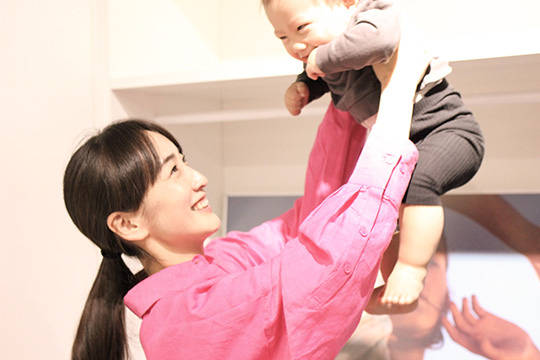
Maki Recently, while I was shopping for a school bag for my eldest son, a salesperson made a negative comment about his color selection. He wanted a red backpack for school, and when we went to take a closer look, the attendant said that no boys choose [the color] red, and that he might be bullied over it. Even though I wanted to let him make his own choice, the comment worried my husband. Raising a child free of traditional gender standards is actually quite a challenge in Japan. What would you have done if you were in my position?
Yasuo Well, I raised my child in the United States. If I were there, then I would buy it for him no question, but in Japan I might reconsider.
Maki These are the elements of Japanese lifestyles that feel so limiting to me—I want to be able to live life and parent however I want, and not worry about all of these silly things.
This might seem like a topic shift, but my eldest son’s kindergarten accepts children of all backgrounds, including those diagnosed with developmental disorders such as autism. Yet when I look at these children, I don’t see any differences between them, rather that they are the same and accept one another. Some may not be able to sit still, some have a strong temper, and some may be more aggressive, but the children themselves do not discriminate or make distinctions, and therefore their interactions seem so normal. I wish our greater society was that way.
Yasuo Autism is such a stigmatized label—it’s the same with depression. In the United States, it’s pretty common to give derogatory names to mental disabilities no matter how subtle the symptoms, but there’s been a recent cultural shift that encourages individuals to legitimize these struggles and accept them. We’ve also created new kinds of coping mechanisms in certain public spaces to help make these people’s lives a little easier. Diagnosing these problems makes them seem like an illness, which is considered strange and taboo.
Maki I also question Japan’s emphasis on marriage prior to having children. For instance, my H&M colleagues from Sweden and Holland that are stationed in Japan had an easier time getting a work visa if they were married. But on the other hand, gay married couples might not be able to get their partner a visa, since gay marriage isn’t considered legitimate in Japan. That simply does not make sense to me.
Yasuo True. From a legal perspective there are some advantages to being formally married with children, but I agree that there should be no difference. Society needs to be accepting of different styles and perspectives, so long as they do not cause any harm to others.
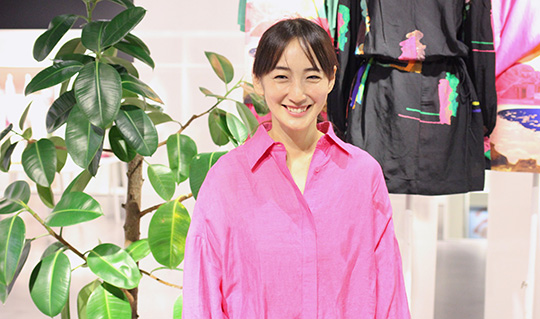
Child’s Play
Maki When I gave birth to my eldest son, I saw all of the other babies lined up in the hospital nursery room and was so confident that I could love any one of them. I think I might like being a foster parent someday.
Yasuo How interesting! I don’t think there are that many foster parents here in Japan. What makes you feel this way?
Maki It may be because of the way I was brought up. My mother was such an empathetic and unique person—she would invite homeless people into our house to take baths, things like that. When I talked with my husband about fostering a child, he thought it was a really nice idea, but also wants me to focus on caring for our current household. I have the time right now to be a good housewife, but it’s just not happening.
Yasuo It sounds like you really hate domestic work!
Maki I do. Despite all of that, I actually went and interviewed for a “weekend foster parent” role that welcomes children for weekends and summer vacations, but I found out that there’s a two year waiting list because it’s a popular program in my area.
Yasuo Wow, really?
Maki That’s right. I still couldn’t give up my desire to do something for these children, so last year, I began a project on SNS that enlists people to dress up as Santa and visit orphanages. I’d heard that many foster children don’t receive the particular gifts they want, so I got a list from a fostering facility and recruited thirty-six different Santas on Instagram. Initially, I was worried about how many people might participate, but it only took half a day to fill all thirty six spots. The plan was for the facility staff to sneakily place a present at the child’s bedside on Christmas Eve at midnight. No one complained, no one said anything negative, and all of the Santas were incredibly supportive. I’m definitely thinking of continuing it this upcoming year.
Yasuo That’s such a phenomenal idea. I’m sure you’ll develop more as you push forward.
Art Holds Fast When All Else Is Lost
Yasuo What are some of your favorite cosmetics?
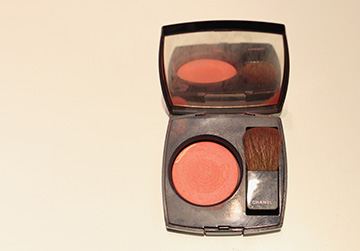
Maki My absolute favorite is Chanel’s Joues Contraste Powder Blush in a coral shade.
Yasuo That color definitely seems to give you a healthy glow.
Maki Yes, it brightens up my face immediately.
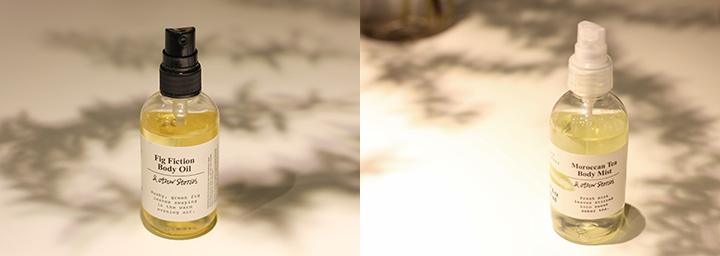
Maki These two products are from H&M’s family brand, & Other Stories, which is not yet available in Japan. The Moroccan Tea body mist is a perfect balance of freshness and sweetness, while the body oil contains the incredibly calming scent of figs.
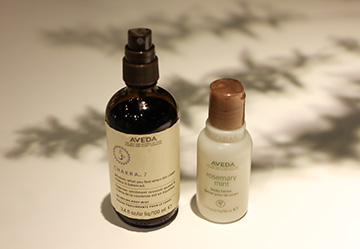
Maki I also love Aveda‘s products— their Chakra Balancing Mist and Rosemary Mint Body Lotion raise my spirits before big meetings. The cool thing about the chakra balancing mists is that they come in a range of numbers from one to seven, so you can choose your scent based on how you’re feeling that day. My personal favorite is #7.
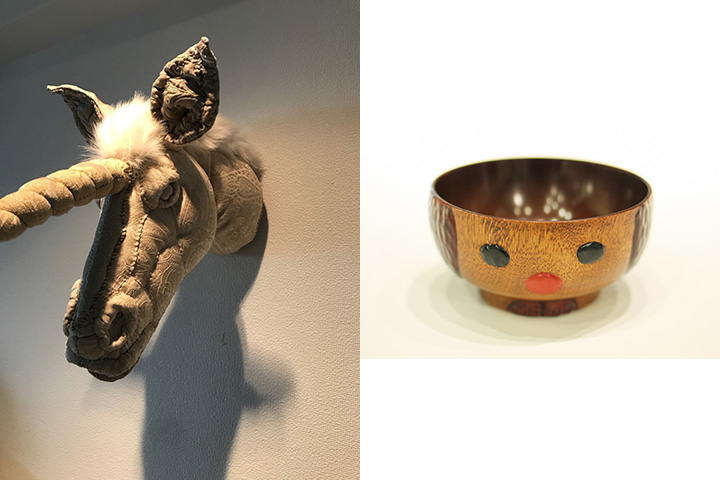
Maki Although lockdown has been incredibly challenging, one of the most rewarding parts is my newfound connection and appreciation for art. I’m not naturally gifted at creating my own work, but the presence of artwork in a space really energizes me. I love decorating my home with pieces made by family and friends.This unicorn was created by a friend who makes stuffed animals, while this bowl is from a lacquer craftsman who lives in Aomori.
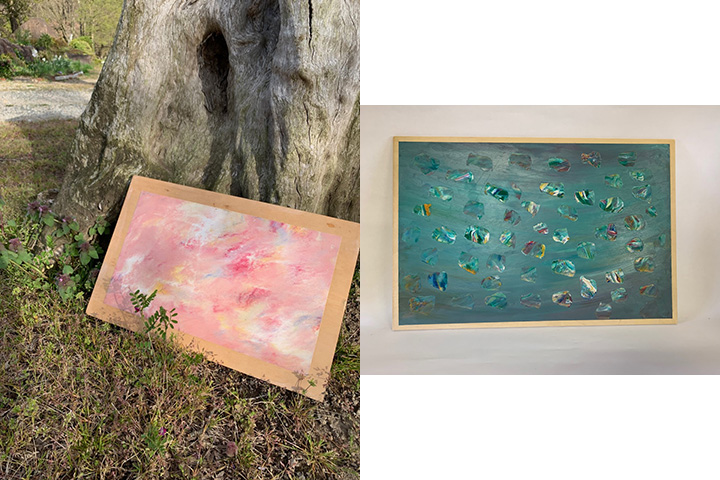
Maki I also really admire this painting, which was drawn by my father who lives in Nasu, Tochigi. Even though it’s hard to have in-person connections right now, these treasures remind me of the people that I love and admire and give me hope for our post-pandemic world.
Photos / Interview : Yasuo Yoshikawa
Text : Mikako Koyama
